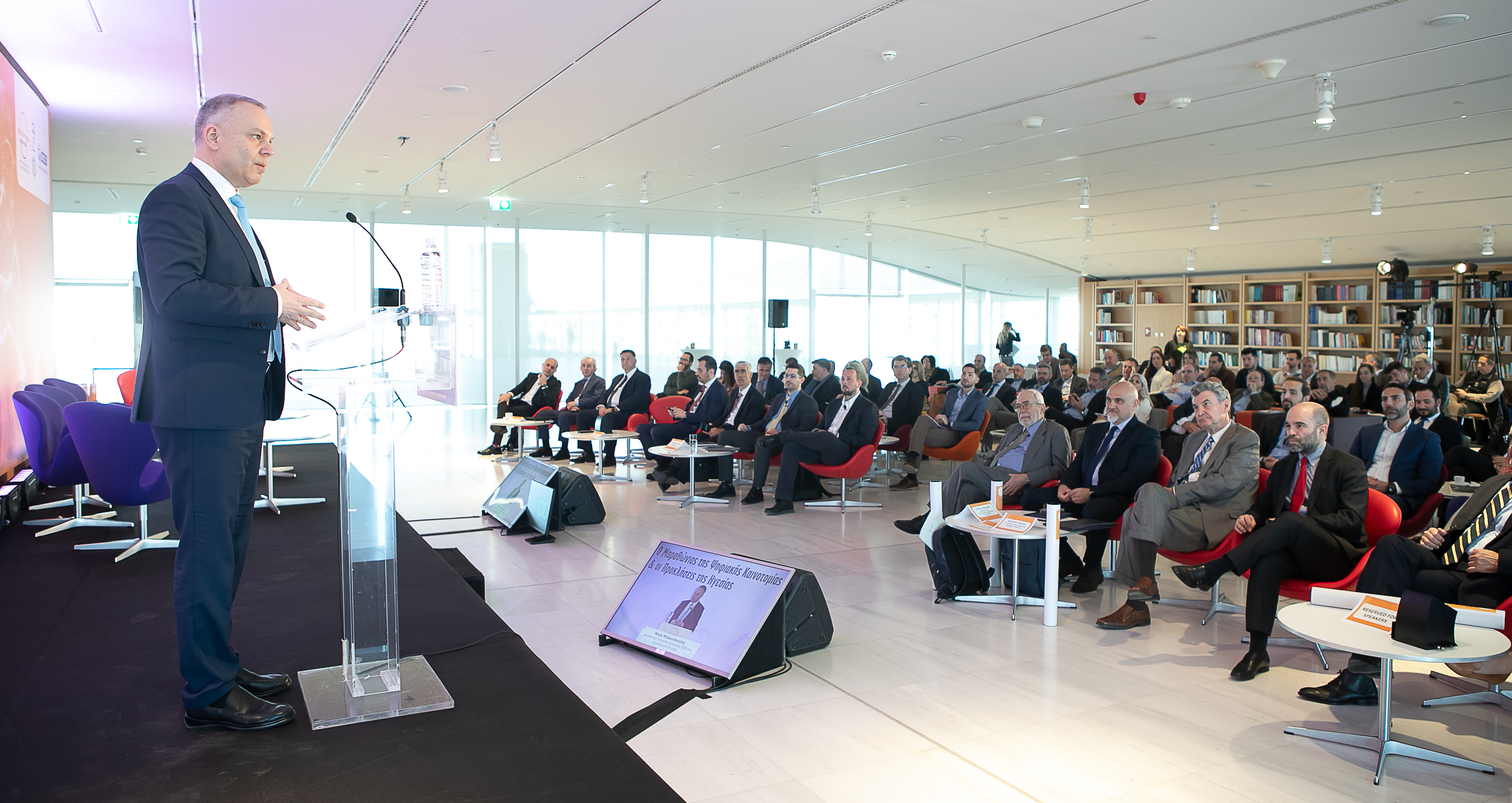Leadership Challenges when Digital Innovation is a Marathon

If digital innovation is a marathon, where organizations need persistence, resilience and adaptability to face the challenges of continuous and rapid improvement, how can we be committed to a world where all people can access and benefit from digital innovation? This question was the foundation of the 4th Annual Symposium of the SEV Center of Excellence in Creative Leadership entitled “Leadership Challenges when Digital Innovation is a Marathon.” Speakers from industry and academia gathered on Thursday, March 30, 2023, at The Lighthouse of the Stavros Niarchos Foundation Cultural Center for four panel discussions on Agile Management, Logistics, Retail and Financial Services.
Dr. George Xirogiannis, Director General at SEV, opened the symposium by explaining that digital transformation has become even more relevant in recent years due to the upheavals in supply chains, green transition and demographic aging, inevitably bringing about major changes in production and employment. “The combination of critical knowledge acquisition by our country’s human capital and changes in business organization model have a ripple effect on digital transition. This knowledge-based capital is an integral part of SEV’s strategy to support its members and businesses.”

Stelios Argyros, President of SEV at Alba Graduate Business School – The American College of Greece (ACG), recognized how the close collaboration between the two institutions has been a key pillar of Alba’s 30 years in operation. “We have worked together to promote excellence and quality upgrade of domestic human talent. This 4th Symposium is part of our broader effort to contribute to highlighting the importance of innovation as a driver of business competitiveness.”

Dr. David G. Horner, ACG President, highlighted: “If digital innovation is a marathon, it will require elite digital performers who will lead the way, who will imagine and commit themselves to open opportunities for others. It will also require enlightened public policy to conceive and construct guardrails to prevent digital innovation from deepening digital divides. As the arc of digital innovation extends for many years beyond, we should heed the lessons of our recent history to forge an ever more just and sustainable path for a digitally enriched common future.”

Dr. Nikos Mylonopoulos, Director of the SEV Center of Excellence in Creative Leadership and Alba Professor of Digital Business, took the floor and highlighted how leaders from different industries put into practice the principles of digital innovation in their business’ digital transition journey. He remarked how “innovation is the means of progress for business, people and society as a whole. In an environment of rapid technological evolution and cataclysmic change, business competitiveness requires tenacity, adaptability and an anti-complacency mindset.”

Digital transformation has become even more relevant in recent years due to the acceleration of technological advancements and the pandemic-driven impetus for more digitization in every social and commercial interaction. Organizations that were previously slow to embrace digital technologies have been forced to adapt rapidly. In practice, leaders are called to set goals and priorities, make compromises, explain why the organization is transforming and motivate people to take ownership of the many changes involved. With these thoughts in mind, the panel discussions revisit selected cases to get an appreciation of how certain leaders confront the challenges of technological, market and organizational transformation when the magnitude and speed of change are breathtaking.
The theme of the 1st panel discussion was “Digitalization in Logistics” and it focused on the significant changes in the logistics industry in the last few years driven by automation and digitalization. The COVID-19 pandemic further accelerated these changes and highlighted the importance of agile and resilient supply chains. The panel moderator was Panagiotis Andrianopoulos, President and CEO, Planning SA and the panelists were (in alphabetical order) Dimitris Bosnidis, Logistics Manager, Coca Cola HBC, George Katiniotis, Head of Country, Ocado Technology , Dimosthenis Kostopoulos, Senior Vice President, Blend360 and Stavros Ponis, Professor of Operations Research & Logistics, National Technical University of Athens. The participants argued that logistics companies had to re-evaluate their supply chain strategies, diversify their supplier base and invest in risk management practices such as contingency planning and scenario analysis. They all agreed that the integration of digital technologies in the logistics industry can bring about a radical revolution in the processes, enabling real-time tracking, automation and data-driven decision-making.

The 2nd panel discussion, entitled “Paradoxes and Leadership in Agile Organization,” delved into how organizing for agility is an essential element of digital transformation and the panelists explained how the principles of agile can be implemented and make a difference in competitiveness and performance. Nikos Mylonopoulos took the helm as moderator with a distinguished group of panelists: Spyros Bethanis, OmniChannel Customer Experience Platforms Director, Eurobank, Christiana Giannioti, Organization & People Advisor, Interamerican, Dimitris Livas, Founder and Managing Partner, Agile Actors and George Riskas-Daniil, Strategy Growth Manager, Philip Morris International. The participants recognized that while short-term planning is necessary to achieve immediate goals, long-term planning is critical to ensuring sustainable growth and success. Additionally, the presenters agreed that while employees should operate autonomously, they should also be held accountable for their actions. This schema enables the formation of a more flexible and adaptable organization that can quickly respond to changing conditions and take advantage of emerging opportunities.

The explosive growth of e-commerce, which has fundamentally changed the retail industry and the way people shop, was at the heart of the 3rd panel discussion, “The Transformation of Retail.” The standout panelists for this discussion were Konstantinos Bakoulas, Vice President Operations, Solutions & Innovation, Circana, George Baltas, Professor of Marketing, Athens University of Economics and Business, Ilias Katsaros, Chief Retail Officer, OPAP and Yiannis Papidis, Chief Technology & Business Change Officer, Dixons SouthEast Europe, moderated by Nikos Mylonopoulos. According to the panelist, purchasing products and services online has provided customers with convenience, flexibility and accessibility while at the same time creating new opportunities for businesses to reach a wider audience by providing personalized experience across all channels.

Over the years, we have observed a convergence between fintechs and banks as the former have had to adhere to stricter regulations and have fought more mainstream risk management practices and business models. The fourth and final panel discussion entitled “Digital Innovation in Financial Services” explored the current state and future potential of innovation in the financial services sector, taking into account the evolving relationship between banks and fintech. The panel moderator was Markos Zachariadis, Chair in Financial Technology & Information Systems, Alliance Manchester Business School; Alba Professor of Financial Technology and Information Systems, along with panelists who are prominent leaders in the banking and fintech industries: Spyros Arsenis, Head of Business Innovation Development Unit, NBG Business, Stefanos Mytilinaios, Chief Operating Officer, Alpha Bank, Thanasis Patsakas, Enterprise Leader, Amazon Web Services EMEA and Vasilis Trapezanoglou, Chairman of the Board, Viva Bank. Participants had the opportunity to discuss the current state and future possibilities of innovation in the financial services sector, highlighting how the digital transition has transformed the industry through the convergence between fintech and banking. Businesses active in fintech utilize this technology to offer innovative and effective solutions that meet the evolving needs of consumers. The panelists agreed that the integration of new technologies forms more personalized and customer-centric services that ensure transparency.

You can view the 4th Annual Symposium of the SEV Center of Excellence in Creative Leadership in its entirety below





